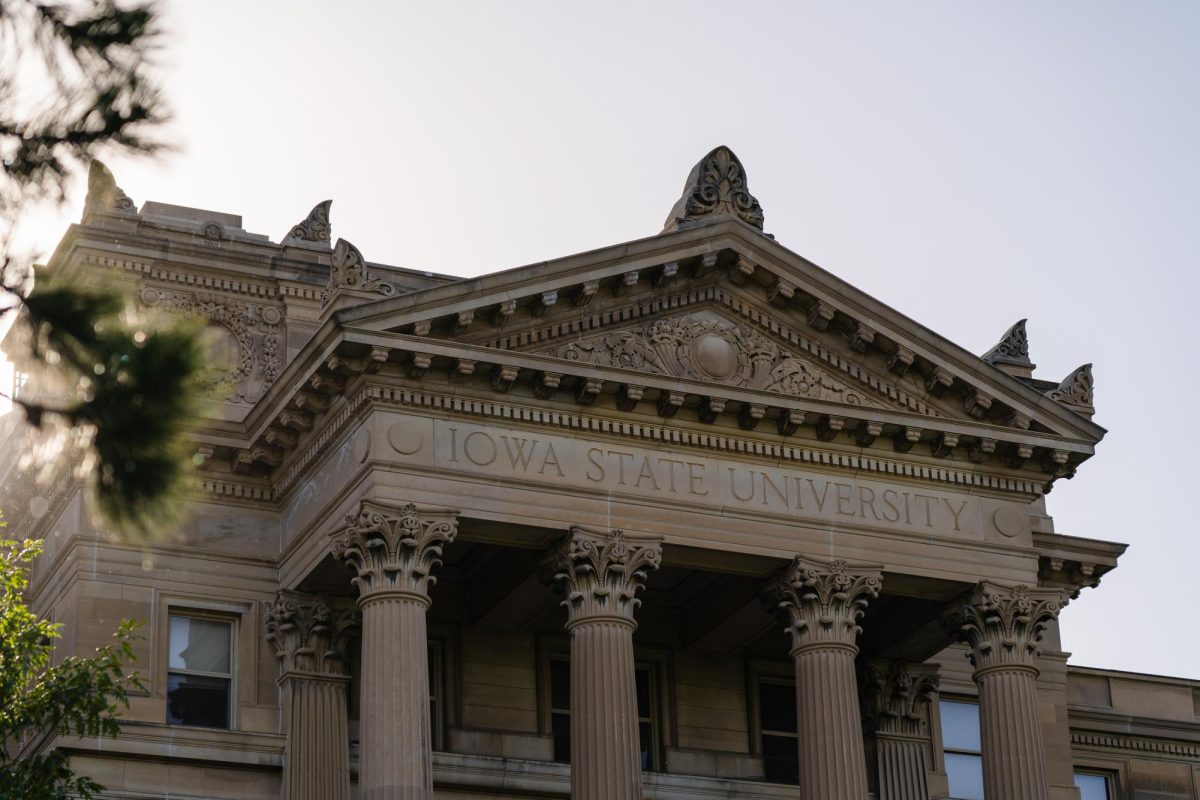Ambiguous employment status frustrates graduate students
February 22, 2022
Graduate student Kate Borchardt came to Iowa State to research wild bees. After being stung more than 17 times during a research project, she developed a severe bee allergy that jeopardizes her career.
Within the past few years, the university changed graduate students’ status from an employee status to a student-only status. While the change in classification may seem minor, it has caused ramifications for graduate assistants like Borchardt who are seeking workers’ compensation benefits.
Graduate students have encountered inconsistencies in their classification at Iowa State. The classification is at times unclear and graduate students receive mixed messages about requirements, benefits and duties within their positions.
In some instances, graduate students are classified as employees and are required to perform the same duties as other employees. For workers’ compensation, however, graduate students retain the student-only status, leaving them with fewer coverage options for injuries sustained while doing research or teaching classes at the university.
Borchardt is a third-year Ph.D. candidate in the department of ecology, evolution and organismal biology (EEOB). She was stung by a bee while conducting research for her graduate research assistantship in July. The sting caused an anaphylactic reaction, after which she developed a severe honey bee allergy.
“I wasn’t allergic at the beginning of last summer, and now I have a high chance of dying from a single sting,” Borchardt said. “It’s kind of difficult thinking that the thing that you work at and you study could kill you.”
Developing an allergy is common in beekeepers, even when following safety protocols as Borchardt did during her research. A treatment called venom immunotherapy is highly effective at reducing the chance of a severe reaction to future stings. The treatment would reduce Borchardt’s allergic response and allow her to continue her research.
Hoping to have the treatment covered, Borchardt filed a claim for workers’ compensation after confirming she had developed the allergy. Her claim was denied.
The denial letter stated, “This claim has been denied as you are a Graduate Student and there was no employee-employer relationship between you and the state of Iowa.”
When Borchardt disputed the denial for her workers’ compensation claim, she received the following response from University Counsel:
“Iowa State University does not classify graduate research assistants as employees…The fact that you receive a graduate research assistantship stipend does not change this, as a stipend is given to support someone while undergoing training or learning and is not considered compensation for work performed.”
The following university representatives declined an interview request from the Daily: University Counsel Michael Norton, Provost Jonathan Wickert, Graduate College Dean William Graves and University Human Resources.
Rob Schweers, director of communications for the Office of the Provost, wrote in a statement, “Students holding assistantships are considered to be in training, and the graduate assistantship is a form of student aid that combines training with income to support their education. Students who teach or perform research as part of their educational program of study are graduate assistants, not hourly employees.”
Carolyn Cutrona, assistant dean of the Graduate College, said graduate students’ classification as either students or employees has been unclear in the past.
“I think it was muddy for a while,” Cutrona said. “I think maybe legal had not made a definitive decision. I’m not sure that it wasn’t just ambiguous for a while, and then we treated people as both students and employees until it became necessary for legal to make a very firm, clear decision.”
However, Cutrona said the university has since clearly classified graduate students as students, not employees.
“Our legal department at ISU has clearly said that graduate students are students, not employees, although they do work for the university,” Cutrona said. “Their work is supposed to be educational…and as part of that education, they are sometimes paid for performing tasks that are needed.”
Borchardt’s research project ended early as a result of her allergy. Until she completes her immunotherapy treatment, which could take about two years, she cannot have close contact with bees.
“In the meantime, I have to purchase and carry Epipens with me at all times and avoid any situation that may result in me getting stung from honey bees,” Borchardt said. “I must now cover my own [treatment] if I want to continue a career studying bees, which is why I became a graduate student at ISU in the first place.”
According to Borchardt, the last time a graduate assistant developed a severe allergy was in 2015, and they received workers’ compensation benefits. Borchardt was never informed that she would not be covered if she sustained an injury while teaching or conducting research for her assistantship.
“I was always under the assumption that, like the previous grad student in 2015, I, as a graduate research assistant doing work for a federal grant, would be covered under workers’ compensation,” Borchardt said.
The Iowa State University Human Resources website also implies that graduate students who receive payment are eligible for coverage.
“Student employees who sustain a work-related injury/illness while working (i.e., paid status) are typically covered under workers’ compensation,” the website reads.
Borchardt said few graduate students are aware of their non-employee status, and many do not realize they are ineligible for workers’ compensation. Borchardt’s graduate adviser and other faculty in her department were not aware either.
“My adviser also mentioned if she knew that we wouldn’t be covered…she could have asked for more grant money to cover these medical expenses,” Borchardt said.
Other university departments were also unaware of the change in status, including employees of the Office of the Registrar.
The associate registrar said in an email to Borchardt that they “believe[d] that graduate assistants who are during the term of their assistantship are employees of the university.”
Graduate students who teach a course at Iowa State are required to accept an “employee confidentiality agreement” in order to access data from the Office of the Registrar and enter student grades. The agreement states that “Access to confidential information is restricted to ISU employees.”
Only employees are allowed access to student information under the Family Educational Rights and Privacy Act (FERPA).
“The university is violating their own policy on confidential information and potentially the law,” Borchardt said. “The university should have a consistent message towards graduate students of their employment status, and currently Office of Registrar language contradicts official graduate student employment status.”
Despite the university’s assertion that graduate students are not employees, their documents frequently use language that refers to graduate students as employees.
The current graduate student handbook states that graduate students receive health insurance “as a benefit of employment.”
The current graduate student handbook for Borchardt’s department states that “failure to comply with employee responsibilities” may result in termination of the graduate assistantship.
Additionally, as a graduate assistant, Borchardt is listed as a public employee of the State of Iowa.
As a teaching assistant, Borchardt was required to complete several “employee” trainings and submit documents that stated or implied she was an employee of the university, including the following:
-
Family Educational Rights and Privacy Act (FERPA) training
-
Family and Medical Leave Act (FMLA) training
-
“Employee conflict of interest and commitment” training
-
“New employee” orientation
Borchardt has served as the hiring manager for six undergraduate student employees since 2019. She approved employee hours and supervised student employees, despite not being an employee herself. Human Resources realized the mistake and removed Borchardt as a job manager in September.
Borchardt was also required to complete a chemical hazard form that listed only “staff member” and “student employee” as options for employee type.
Borchardt said the continued inconsistencies in the classification of graduate students “mislead graduate students with regards to their employee status.”
Some graduate students have expressed confusion and frustration over the ambiguity and inconsistent messaging from the university about their classification.
“To me, it really is seeming like we are employees when it’s convenient, and when it’s not convenient, we’re students,” said Erika Ibarra-Garibay, a graduate student in EEOB. “The lack of communication, unfortunately, leaves many of us confused and frustrated.”
Since learning that graduate students are not covered under workers’ compensation, Ibarra-Garibay said some students feel less comfortable performing tasks for their research.
“There are students who are worried because some of us do work that involves risk,” Ibarra-Garibay said. “Every time we go to the field, am I not going to get covered?”
She hopes the university will change graduate students’ status back to employees.
“Having this status would allow us to receive proper compensation and protection,” Ibarra-Garibay said.
Although the classification has been unclear, Ibarra-Garibay believes graduate students lost their employee status when the university implemented WorkDay in the summer of 2019. WorkDay is the university’s financial management platform.
Cutrona said the only instance where the non-employee classification has caused issues is with workers’ compensation. According to Cutrona, Iowa State classifies graduate student activities as “educational,” preventing graduate students from receiving employment benefits for their work.
“If they are working, say, on their own dissertation research and they get hurt… workers’ comp judges that it was an educational activity, not a work activity,” Cutrona said.
Cutrona said graduate students receive a stipend instead of a salary and they are provided health insurance through the Student and Scholar Health Insurance Program (SSHIP).
Borchardt said many graduate students might be exposed to potential risk or injury as a result of their studies, particularly in the sciences. Graduate students who serve as teaching assistants are routinely required to lead labs for undergraduate classes that may expose them to injury.
“Graduate assistants appear to be the only ones affected, as hourly undergraduate student workers are considered employees with workers’ compensation benefits,” Borchardt said. “Therefore, on the federally-funded research project I led this summer, the staff beekeeper specialist, my three undergraduate assistants and my adviser were all covered if they developed an allergy.”
Chelsea Iennarella-Servantez, president of the Graduate and Professional Student Senate (GPSS) at Iowa State, said the policies about classification do not provide clear guidance for graduate students.
“It’s kind of ambiguous and doesn’t necessarily clarify…some of the gaps, especially when it comes to student responsibilities,” Iennarella-Servantez said. “It leaves graduate students exceptionally vulnerable to either deliberate or even accidental exploitation.”
Ibarra-Garibay feels the classification of graduate students as non-employees is part of a greater trend of mistreating graduate students.
“If students are seeing that they’re mistreated in some way…why would students put themselves through that?” Ibarra-Garibay said. “I really don’t see how any university would be able to sustain…without its students.”
The policies regarding graduate students’ benefits and classification vary between the regent universities in Iowa, according to Iennarella-Servantez.
“Iowa State and the University of Iowa do things differently. Part of that is there is a graduate student union at the University of Iowa, and there isn’t here,” Iennarella-Servantez said.
A representative for the University of Iowa graduate student union confirmed the differences between the two universities. All graduate students at the University of Iowa are classified as students, but graduate students who have a research or teaching assistantship are also employees of the university.
Iennarella-Servantez said the “legal minimum” regarding benefits and compensation might not be an appropriate standard for Iowa State to set for the protection and care of graduate students.
“My question for Iowa State is not ‘Have we met our legal obligations?’ It’s, ‘Have we met the needs of our students?’” Iennarella-Servantez said. “I don’t write policy…but you have to make sure that those that are most vulnerable are protected from exploitation.”







